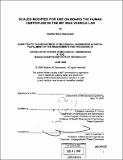Scales modified for use on board the human centrifuge in the MIT Man Vehicle Lab
Author(s)
Samuelson, Heather Marie
DownloadFull printable version (2.619Mb)
Other Contributors
Massachusetts Institute of Technology. Dept. of Mechanical Engineering.
Advisor
Laurence R. Young.
Terms of use
Metadata
Show full item recordAbstract
The MIT Man Vehicle Lab (MVL) is currently performing research on the effects of rotational artificial gravity on humans through the use of a short-radius centrifuge. The MVL centrifuge allows subjects to spin in the supine position with their heads at the center of rotation and their feet facing outwards. To collect information regarding actual forces experienced by a subject while on the centrifuge, a set of scales was designed specifically to measure the equivalent of the human body's weight in artificial gravity. These were mounted on board a stair stepper exercise device to measure the forces exerted at the feet of subjects while exercising. Exercise is particularly important in preventing microgravity-induced deconditioning of the body and without exercise a deconditioned subject might not be able to withstand the stress of experiencing artificial gravity. The primary focus of the research is to gain a better understanding of the overall effects resulting from artificial gravity on humans and eventually to alleviate undesirable ones. The Contek WCS-20® bathroom scale was redesigned to fit on board the stair stepper device on the centrifuge and to safely and securely measure the forces exerted by each foot of a subject while exercising. (cont.) It was also modified to give continuous force readouts; measurements were made while a subject was performing simple exercises on a stair stepper device in artificial gravity. The subject was spun at 0, 12.5, 23 and 30 rpm on the centrifuge and force measurements were taken at each speed. The forces from the two scales (left foot and right foot) sum to give the subject's total equivalent weight at each rotational speed. In addition, the forces exerted radially by the subject vary as he altered his body's distance from the center of the centrifuge through the series of exercises. These scales can be used to provide foot force data and, from this, a better understanding can be gained of the overall effects of artificial gravity on the human body.
Description
Thesis (S.B.)--Massachusetts Institute of Technology, Dept. of Mechanical Engineering, 2006. Page 54 blank. Includes bibliographical references (p. 37-38).
Date issued
2006Department
Massachusetts Institute of Technology. Department of Mechanical EngineeringPublisher
Massachusetts Institute of Technology
Keywords
Mechanical Engineering.